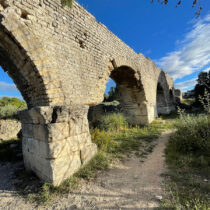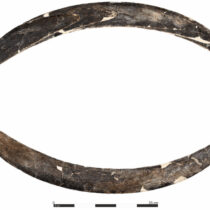A four-week archeological investigation has verified the location of the first skirmish of the French and Indian War. Through a partnership project, several 18th century ballistics and other artifacts were recently uncovered at Jumonville Glen, part of Fort Necessity National Battlefield.
A 15-minute skirmish at Jumonville Glen on the morning of May 28, 1754, launched the seven-year French and Indian War. Virginia provincial troops under the British flag, commanded by 22-year-old Lieutenant Colonel George Washington, were led by members of Seneca, Oneida and other allied Tribes to a French campsite at the glen. Shots were fired and when it was over, 13 Frenchmen were dead and 21 captured. British casualties were one killed and two or three wounded.
“The archeology project was the first serious investigation of the historic skirmish site,” said Fort Necessity Superintendent Stephen M. Clark. “Through the help of this partnership project, the National Park Service can now provide a deeper understanding of where the French and Indian War started.”
The partners who conducted the archaeological investigation at Jumonville Glen include:
· American Veterans Archaeological Recovery (AVAR)
· National Park Service Northeast Archeological Resources Program
· National Park Service Northeast Museum Services Center
· Paul Martin Archaeology Associates
· Advance Metal Detection for the Archaeologist (AMDA)
“Fort Necessity National Battlefield remembers the Jumonville Affair annually with living history programs,” said Fort Necessity National Battlefield Chief of Interpretation and Site Manager Brian Reedy. “We can now, with high confidence, conclude the site we protect is indeed the location of the May 28, 1754, skirmish.”
On Saturday, May 27 and Sunday, May 28, 2023, Fort Necessity National Battlefield will host a living history program recreating camp life near the reconstructed Fort Necessity to observe the 269th anniversary of the Jumonville Affair. Volunteers, staff and living historians will portray members of the British and French armies and Native Americans who served at the Great Meadows in 1754.
On both days, ranger programs at 11 a.m., 1 p.m., and 3 p.m. will conclude with weapons firing demonstrations. On Sunday, May 28 at 7 a.m., a park ranger-led walk will start from the Jumonville Glen parking area and highlight the historical events of that fateful morning. Programs will take place rain or shine, and visitors are encouraged to dress appropriately for the weather and wear sturdy shoes.
Fort Necessity National Battlefield
Fort Necessity National Battlefield is a unit of the National Park Service and the site of the opening battle of the French and Indian War that ended with the removal of French power from North America. National Parks are protected by the Archaeology Resources Protection Act. For more information about Fort Necessity National Battlefield, visit www.nps.gov/fone.
About the Jumonville Affair
Jumonville Glen is a section of Fort Necessity National Battlefield. At dawn, May 28, 1754, three cultures clashed at Jumonville Glen. This skirmish began the seven-year French and Indian War. Virginia provincial troops under the British flag, commanded by 22-year-old Lieutenant Colonel George Washington, were led to the glen by Natives from Seneca, Oneida and other allied Tribes to the unsuspecting French camped there. For nearly fifteen minutes the glen was filled with gunfire. In the aftermath, a global war ensued.



